It looks like you're using an Ad Blocker.
Please white-list or disable AboveTopSecret.com in your ad-blocking tool.
Thank you.
Some features of ATS will be disabled while you continue to use an ad-blocker.
share:
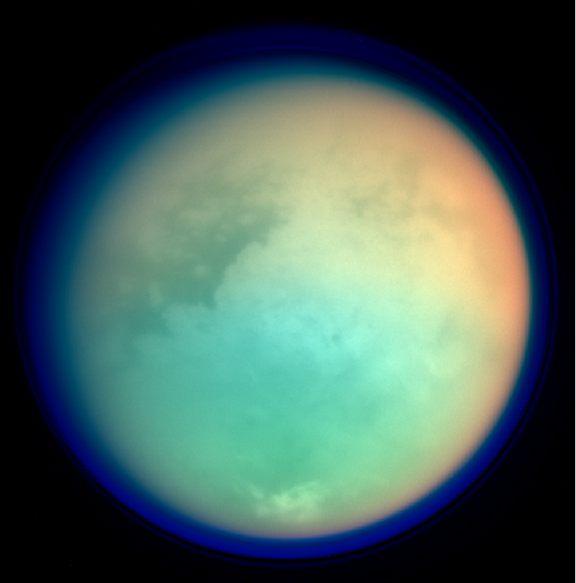
Liquid 'waves' detected on Saturn's moon Titan
PTI | London | Updated: Mar 19 2014, 14:47 IST
Scientists have detected the first liquid waves on the surface of another world after they found telltale signs of isolated rippling in a sea on Saturn's moon Titan.
The signature of isolated ripples was observed in the 380-km wide sea on Titan called Punga Mare.
Unlike Earth's waves of water, the seas on Titan are composed of hydrocarbons such as ethane and methane. These exist in their liquid state on Titan, where the surface temperature averages about -180C.
The new findings were discussed by planetary scientist Jason Barnes, of the University of Idaho in US, at the 45th Lunar and Planetary Science Conference (LPSC), which was held in Texas.
Titan is a bizarre, looking-glass version of Earth with a substantial atmosphere and a seasonal cycle. Wind and rain shape the surface to form river channels, seas, dunes and shorelines.
The vast majority of Titan's lakes and seas are concentrated around the north polar region. Just one of these bodies of liquid - Ligeia Mare - is estimated to contain about 9,000 cubic km of mostly liquid methane, equating to about 40 times the proven reserves of oil and gas on Earth.
An image of Titan's north pole taken by the Cassini probe during a flyby in July 2012 shows sunlight being reflected from surface liquid in much the same way as a mirror re-directs light. This phenomenon is known as a specular reflection, 'BBC News' reported.
Barnes used a mathematical model to investigate whether the features in the image were compatible with waves.
"We think we've found the first waves outside the Earth," he said.
Okay, here we go. This seems like a very interesting find if true. I can't wait to see closer images and hopefully if we the human race doesn't do itself in over ignorance we could one day land on it and explore there. Titan has always looked a bit odd to me. Who knows, maybe while we are scratching dirt on Mars there may be a whole alien aquatic ecosystem just below the surface on Titan.
As always, Stay tuned.
Wooooow, amazing news! I love Titan. It's so remote and alien, yet so similar to Earth.
Hopefully there will be more science-oriented articles on this than from "The Financial Express", as I'm interested in the exact detail of how this discovery was made.
One of my favourite pastimes is perusing the raw Cassini image archive to work with images taken through various filters, including infrared images that show those hydrocarbon lakes and dunes on the surface. Here's an example I made, which has been added to NASA's Amateur Images gallery:
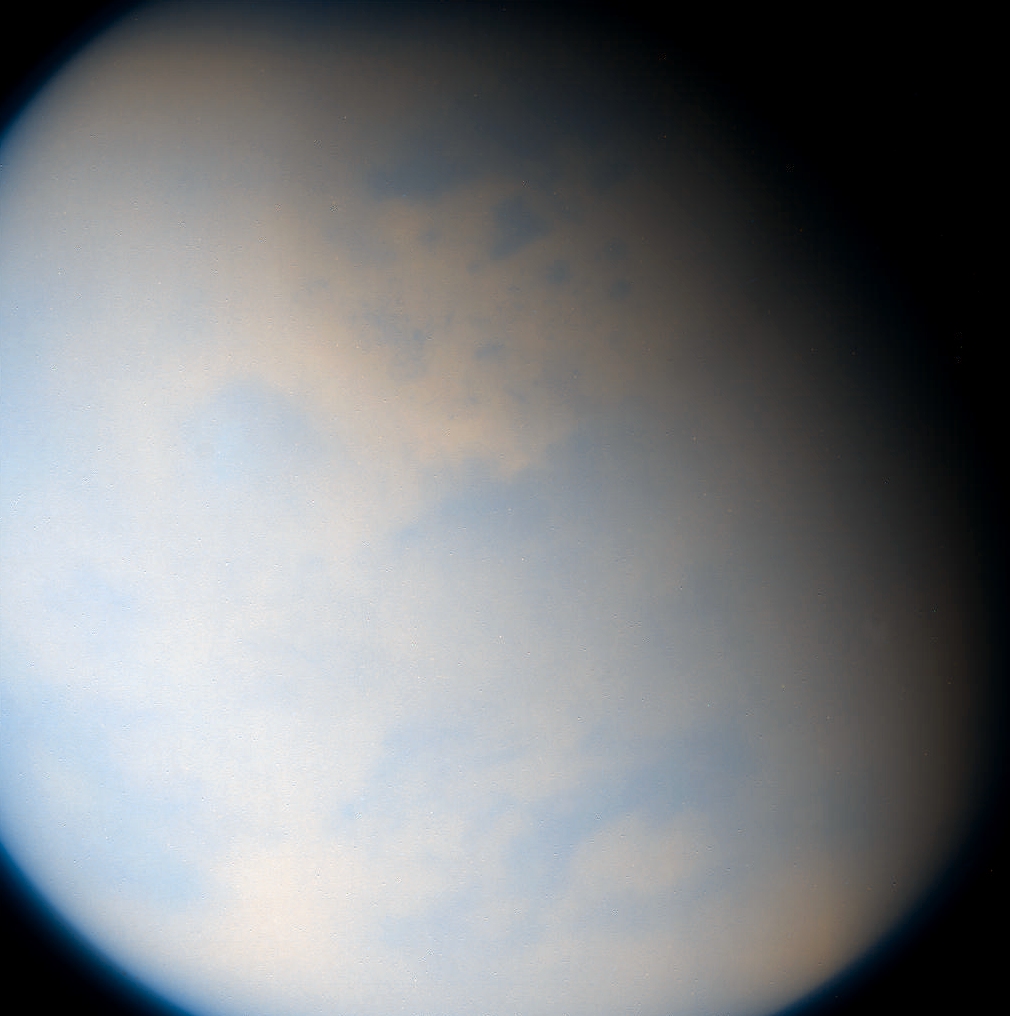
Here's another one, showing mostly the dunes around the equator:
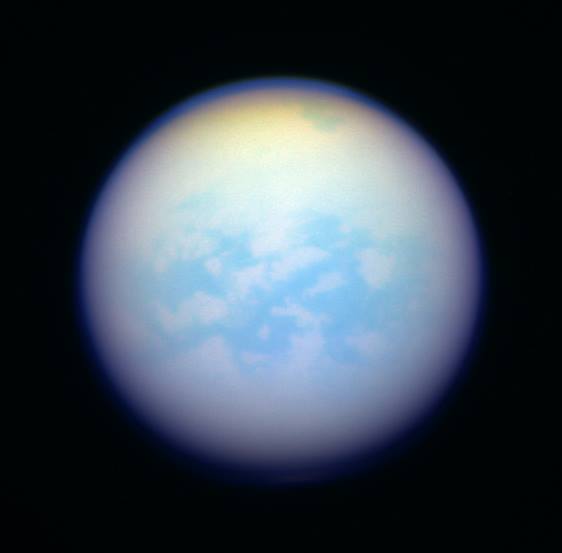
P.S. More info here: www.nature.com...
Hopefully there will be more science-oriented articles on this than from "The Financial Express", as I'm interested in the exact detail of how this discovery was made.
One of my favourite pastimes is perusing the raw Cassini image archive to work with images taken through various filters, including infrared images that show those hydrocarbon lakes and dunes on the surface. Here's an example I made, which has been added to NASA's Amateur Images gallery:

Here's another one, showing mostly the dunes around the equator:

P.S. More info here: www.nature.com...
A spectrometer aboard Cassini took images of Punga Mare as the spacecraft flew past it several times during 2012 and 2013. Those images showed sunlight glinting off the ocean’s surface, as might be seen on Earth when an aeroplane flies low over a lake at dusk.
Four pixels in the images are brighter than one might expect from reflecting sunlight, Barnes reported at the conference. He concluded that they must represent something particularly rough on the surface — a wave or set of waves.
edit on 19-3-2014 by wildespace because: (no reason
given)
reply to post by wildespace
Sorry, it was all I could find at the time as far as source. I too would love to read more detail.
Hopefully you'll keep us up to date?
Sorry, it was all I could find at the time as far as source. I too would love to read more detail.
Hopefully you'll keep us up to date?
reply to post by SLAYER69
Surf's up!
"Surfing on Titan" could be a fine science fiction/romantic comedy remake of "Gidget"
Good find, and the need for dozens of Rovers on all of the moons and planets of the solar system becomes more self-evident with each accumulating discovery.
Surf's up!
"Surfing on Titan" could be a fine science fiction/romantic comedy remake of "Gidget"
Good find, and the need for dozens of Rovers on all of the moons and planets of the solar system becomes more self-evident with each accumulating discovery.
reply to post by Aleister
But the surface tension would be too low, you would never float , nvm buddy SURF UP!!!
Surf's up!
But the surface tension would be too low, you would never float , nvm buddy SURF UP!!!
Indigent
reply to post by Aleister
Surf's up!
But the surface tension would be too low, you would never float , nvm buddy SURF UP!!!
Interesting point. Is it the surface tension of methane that would make floating impossible or the gravitational pull of Titan? Sounds like one of those examples for high school science class, the thought problem of surfing on Titan's methane shores (alas, Mr. Vonnegut, where are you when we need you most?).
reply to post by Aleister
We should not waste time with theoretical reasoning and just expend some billions to equip a bot with a surf table and send it over there
(It also depends on the atmosphere by the way)
We should not waste time with theoretical reasoning and just expend some billions to equip a bot with a surf table and send it over there
(It also depends on the atmosphere by the way)
Aleister
reply to post by SLAYER69
Surf's up!
"Surfing on Titan" could be a fine science fiction/romantic comedy remake of "Gidget"
Good find, and the need for dozens of Rovers on all of the moons and planets of the solar system becomes more self-evident with each accumulating discovery.
There's actually been a few really good sci-fi short stories using that premise.
Damned if I can remember the titles right now though...
If I can shake those brain cells loose I'll post them.
reply to post by SLAYER69
Cool!
One of my 3 favorite places in the solar system. They are in order - Titan, Europa & Phobos.
The moons of our solar system are incredibly interesting. We definitely should send probes to Europa & Titan. Yesterday.
But we ought to go to Phobos ourselves - right after Mars. Since it's so small, we could make it a day trip from Mars and finally see what's up with that monolith.
Cool!
One of my 3 favorite places in the solar system. They are in order - Titan, Europa & Phobos.
The moons of our solar system are incredibly interesting. We definitely should send probes to Europa & Titan. Yesterday.
But we ought to go to Phobos ourselves - right after Mars. Since it's so small, we could make it a day trip from Mars and finally see what's up with that monolith.
Indigent
reply to post by Aleister
Surf's up!
But the surface tension would be too low, you would never float , nvm buddy SURF UP!!!
Floating happens when an object is less dense than the liquid. Surface tension has nothing to do with this, as far as I know.
Liquid methane is much thinner than water, objects made of wood would sink in it.
By the way, just stumbled across this article: Cassini Suggests Icing on a Lake
Waves AND icebergs? I want a vacation to Titan already!
reply to post by wildespace
Im sorry but you are mistaken, Surface tension
the equation is at the link
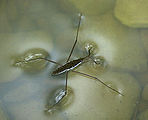
________
Sorry for derail op
Floating happens when an object is less dense than the liquid. Surface tension has nothing to do with this, as far as I know.
Im sorry but you are mistaken, Surface tension
When an object is placed on a liquid, its weight Fw depresses the surface, and is balanced by the surface tension forces on either side Fs, which are each parallel to the water's surface at the points where it contacts the object...
the equation is at the link

________
Sorry for derail op
edit on 19-3-2014 by Indigent because: (no reason given)
reply to post by Indigent
Surface tension helps objects float, true, but that's generally not why objects float. Surface Tension vs. Floating. A thin aluminum disc carefully placed on the surface of water will stay there due to surface tension, but will sink if you submerge it. A piece of plastic will float no matter what, because it is less dense than water.
~~~
Here's the annotated version of my earlier image, showing the lake Punga Mare where those waves were detected. N marks the North Pole.
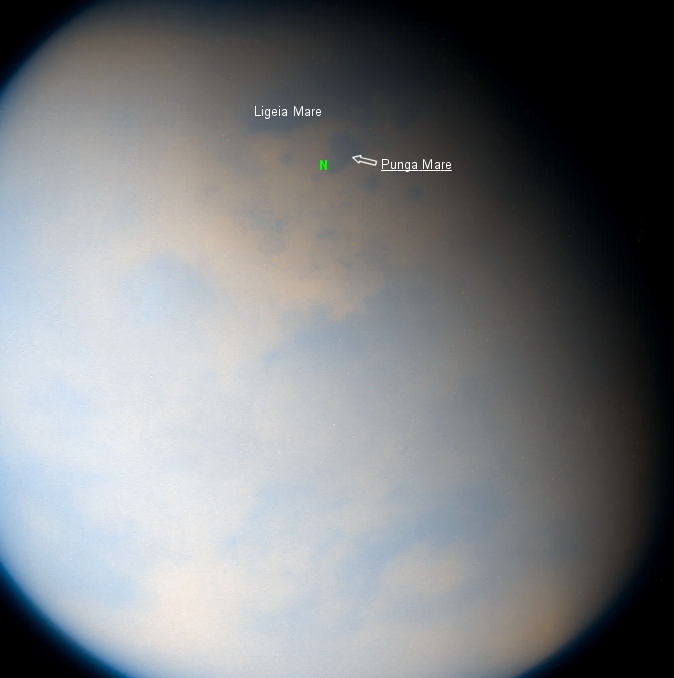
Same view using visible light data for colour, and infrared data to show the lakes:
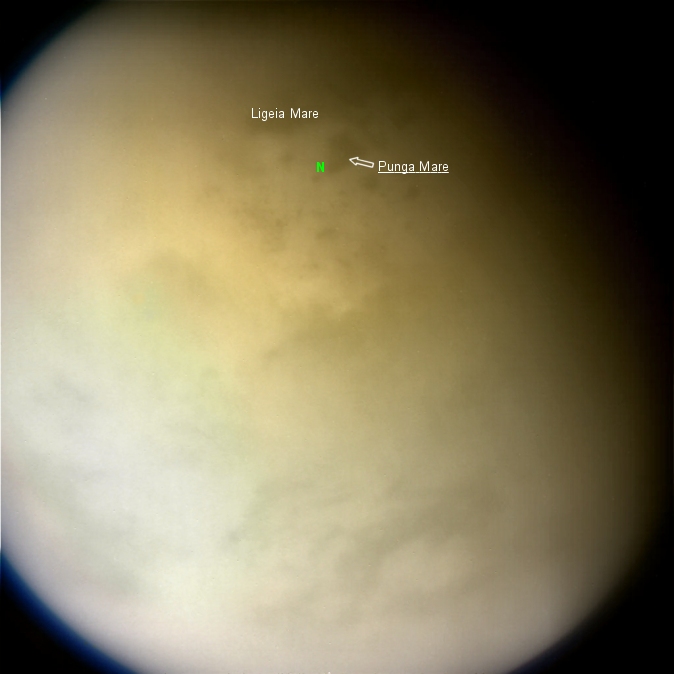
Surface tension helps objects float, true, but that's generally not why objects float. Surface Tension vs. Floating. A thin aluminum disc carefully placed on the surface of water will stay there due to surface tension, but will sink if you submerge it. A piece of plastic will float no matter what, because it is less dense than water.
~~~
Here's the annotated version of my earlier image, showing the lake Punga Mare where those waves were detected. N marks the North Pole.

Same view using visible light data for colour, and infrared data to show the lakes:

edit on 19-3-2014 by wildespace because: (no reason given)
edit on 19-3-2014 by wildespace because:
(no reason given)
reply to post by SLAYER69
Interesting find Slayer. Could it possibly be methane waves being mistaken for water waves on Titan?
Would the signature be similar.
I would love for more exploration of Titan. I think it holds untold mysteries waiting to be discovered.
Des
Interesting find Slayer. Could it possibly be methane waves being mistaken for water waves on Titan?
Would the signature be similar.
I would love for more exploration of Titan. I think it holds untold mysteries waiting to be discovered.
Des
40 times the known reserves on Earth of gas and oil!?
If that's not motivation for our corporate masters I don't know what is, although Earth could not handle that much more pollution.
Could be good for conventional rockets, but the people who would ultimately fund and execute such a venture are probably the same people who wouldn't need rockets to get there!
The thought of waves splashing around helps potray a certain realness of the environment , and a similarly with Earth which is easy to visualise.
If that's not motivation for our corporate masters I don't know what is, although Earth could not handle that much more pollution.
Could be good for conventional rockets, but the people who would ultimately fund and execute such a venture are probably the same people who wouldn't need rockets to get there!
The thought of waves splashing around helps potray a certain realness of the environment , and a similarly with Earth which is easy to visualise.
edit on 19-3-2014 by Soapusmaximus because: spelling
lovely ten thousand billion rotten eggs would not do the smell of methane on that planet justice
Nope. Just a flash similar to the one seen on Jupiter. Probably an asteroid.
All the fuel!!
But on Titan Oxygen would be the fuel, because the gas on Titan would not burn without it.
But on Titan Oxygen would be the fuel, because the gas on Titan would not burn without it.
new topics
-
Any one suspicious of fever promotions events, major investor Goldman Sachs card only.
The Gray Area: 1 hours ago -
God's Righteousness is Greater than Our Wrath
Religion, Faith, And Theology: 5 hours ago -
Electrical tricks for saving money
Education and Media: 8 hours ago -
VP's Secret Service agent brawls with other agents at Andrews
Mainstream News: 10 hours ago -
Sunak spinning the sickness figures
Other Current Events: 10 hours ago -
Nearly 70% Of Americans Want Talks To End War In Ukraine
Political Issues: 10 hours ago
top topics
-
VP's Secret Service agent brawls with other agents at Andrews
Mainstream News: 10 hours ago, 9 flags -
Cats Used as Live Bait to Train Ferocious Pitbulls in Illegal NYC Dogfighting
Social Issues and Civil Unrest: 14 hours ago, 8 flags -
Electrical tricks for saving money
Education and Media: 8 hours ago, 4 flags -
Nearly 70% Of Americans Want Talks To End War In Ukraine
Political Issues: 10 hours ago, 3 flags -
Sunak spinning the sickness figures
Other Current Events: 10 hours ago, 3 flags -
Late Night with the Devil - a really good unusual modern horror film.
Movies: 12 hours ago, 2 flags -
The Good News According to Jesus - Episode 1
Religion, Faith, And Theology: 15 hours ago, 1 flags -
Any one suspicious of fever promotions events, major investor Goldman Sachs card only.
The Gray Area: 1 hours ago, 1 flags -
God's Righteousness is Greater than Our Wrath
Religion, Faith, And Theology: 5 hours ago, 0 flags
active topics
-
God's Righteousness is Greater than Our Wrath
Religion, Faith, And Theology • 8 • : randomuser2034 -
-@TH3WH17ERABB17- -Q- ---TIME TO SHOW THE WORLD--- -Part- --44--
Dissecting Disinformation • 661 • : Justoneman -
SETI chief says US has no evidence for alien technology. 'And we never have'
Aliens and UFOs • 59 • : andy06shake -
HORRIBLE !! Russian Soldier Drinking Own Urine To Survive In Battle
World War Three • 36 • : TheMisguidedAngel -
British TV Presenter Refuses To Use Guest's Preferred Pronouns
Education and Media • 146 • : Consvoli -
Nearly 70% Of Americans Want Talks To End War In Ukraine
Political Issues • 19 • : Consvoli -
Terrifying Encounters With The Black Eyed Kids
Paranormal Studies • 76 • : Consvoli -
Samuel Aun Woer
Religion, Faith, And Theology • 27 • : helebi20 -
Any one suspicious of fever promotions events, major investor Goldman Sachs card only.
The Gray Area • 2 • : Cavemannick -
VP's Secret Service agent brawls with other agents at Andrews
Mainstream News • 42 • : 38181

